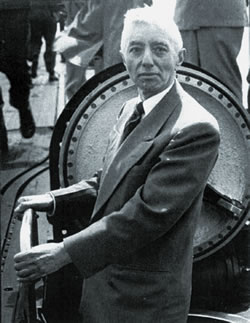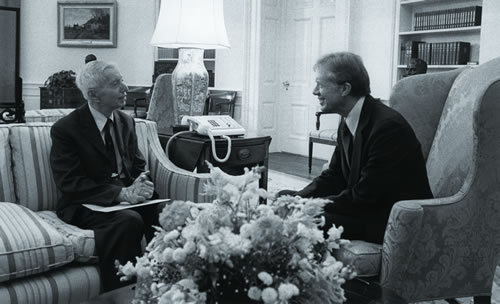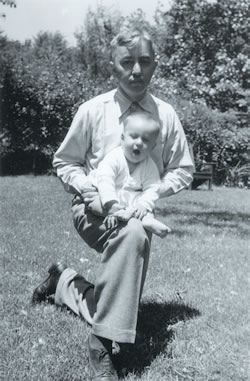This piece is from a eulogy given at Temple B’nai Jeshrun, Lincoln, Neb., at Yom Kippur services on Oct. 9, 2008. Admiral Rickover, known as the Father of the Nuclear Navy, died on July 8, 1986, and is buried in Arlington National Cemetery.
Today Admiral Hyman G. Rickover is best remembered for developing the atomic-powered submarine. With the launching of the first of these submarines, the Nautilus, in 1954, he was dubbed “The Father of the Atomic Submarine.” As Admiral Rickover’s only child, that made me "The Atomic Submarine", and you can imagine what I now had to live up to. And just when I had become used to it, several atomic-powered surface ships were built and my father became “The Father of the Nuclear Navy”—and I acquired an even more bizarre identity!
My father had a well-deserved reputation for doing whatever was necessary to see his projects to completion. He was famous for ignoring traditional naval customs and for bypassing existing organizational hierarchies. He created his own independent power structure with the help of sympathetic members of Congress and the media. He demanded the very highest standards and pushed defense contractors, his staff and himself to the limit.
He would fly into a rage with anyone he felt was lazy or incompetent. His interviews with the young officers who wanted to join his program were legendary. He wanted to make sure they could adapt to whatever situation they found themselves in, and so they were often placed in unexpected and stressful circumstances. During the interviews, they typically found themselves sitting in a chair with the front two legs shortened so that they had to struggle to remain seated. If they gave unsatisfactory answers to my father’s questions, they were summarily dismissed or sent to sit in a broom closet for hours to re-think their answers. Many were assigned bizarre and extremely challenging tasks to test their resourcefulness.
Of course, I didn’t see a lot of this firsthand, but when my father was at home, he spent a good deal of time on the phone, and my mother and I could always tell whether he was talking to an errant contractor (loud cursing and yelling), one of his subordinates (never a “hello” or “goodbye,” as these niceties wasted precious seconds), or to a congressman, senator or other VIP (polite and very respectful).
Today, I’d like to talk about some aspects of my father’s personal life that are not so well known.
Although he traveled a great deal, he tried to be home for at least part of every weekend. On Sundays, he and I would take very long walks through Washington’s Rock Creek Park, and we discussed all manner of topics. I recall once, during the 1952 presidential campaign, he said he didn’t think Eisenhower would win. I was certain he would and offered to bet money not only on the national election but on the outcome in a number of states. I won every bet and pocketed several dollars, a small fortune for me. But what I remember most was his pride in my prognostic ability. For years, he told the story of how his son outsmarted him to anyone who would listen.
During these walks, we made it a point to visit residential building sites on the way home. These sites often yielded empty deposit bottles left by construction workers, which we collected. Ordinary bottles were worth two cents and large ones five cents, and I got to return them to the local grocery and keep the refunds. Our neighbors became used to seeing the famous admiral and his son schlepping large brown bags filled with dirty soft drink bottles.
This was just one example of my father’s thrift. He washed his own socks and hung them to dry in the bathroom, he replaced the heels on his shoes, and whenever the military released unneeded food rations, he’d bring home boxloads of canned foods and K-rations for us to eat. Typically, the cans were brown and had labels like “Chicken, whole, boneless, cooked.” I particularly like the K-rations because they contained cracker sandwiches filled with peanut butter and a candy bar.
He was certainly thrifty, but my father could also be extremely generous with his money as well as with his time. He donated all the profits from his books and the honorariums from his many speaking engagements to a Jewish orphanage in Chicago. When one of his staff died during surgery, he made sure his widow had enough money to tide her and her family over and went to great lengths to find her a good job with the civil service.
He became outraged when the car belonging to a secretary in his office was damaged while being towed by a building contractor from a vacant lot adjoining a construction project. After making some phone calls—in a way that only he could!—he determined that the lot was actually owned by the State of Virginia and that the construction company had started using it illegally for storage. He made sure they paid a hefty fine and that they replaced the damaged car with a new one.
My father was particularly generous with his family. When I did a ninth-grade science project on vacuum tubes (anyone remember those?), he assembled a huge collection of them and delivered them to my school. He arranged for my Cub Scout troop to have a special tour of the Naval Academy at Annapolis. My friends and I often got to visit Navy ships with him and, later, a nuclear submarine.
At times, he misjudged our needs. My mother once casually mentioned that she had made good use of some little airline soap bars my father brought home. From then on, whenever he returned from a trip, he’d empty a couple of dozen of these bars from his briefcase. The supply far exceeded the demand. We lived in a fairly small apartment and there wasn’t really much room for storage, so the bars began accumulating in a couple of large baskets under the kitchen counter. Eventually, I was assigned the chore of taking them down to the basement where refuse was stored prior to pick up. This was a tricky task that required careful timing, since the trash was removed only once a week and my father was in the habit of going down there himself to look for reuseable cast-offs.
On a more serious note, when the atomic-powered submarine Thresher disappeared while conducting deep sea tests in 1963, he was devastated. He had been on the sub during its initial sea trials two years earlier—just as he had for every new atomic submarine since the Nautilus. He felt that it was only fair to share the risks inherent in the first voyage of any submarine for which he was responsible.
When he heard the news about the Thresher, he stayed up all night hoping against all odds that she would be found and that her crew would be OK. When she was located at the bottom of the sea, broken apart into six sections, he wrote personal letters of condolence to the relatives of the 129 officers, crewmen and civilians who had been on board. He didn’t talk about it very much, but my mother told me that he agonized over this loss for years, long after it had became clear that faulty welding during repairs in a Navy shipyard—something over which he had no control—was the cause of the disaster.
My father cared deeply about his country and was very worried about the threats to our security posed by the Soviet Union and China during the Cold War. I believe this explains why he could be such a hard taskmaster. However, his caring was not limited to the national level. He was a man who cared deeply for the Jewish values of family, charity and justice, as I hope I’ve been able to show in these remarks.


